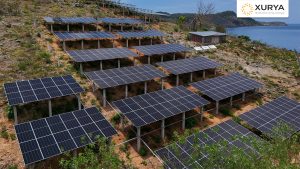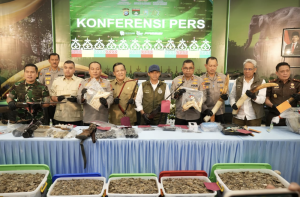Jakarta – Civil society activists highlight the decline in ambition for the 2030 renewable energy mix target in the draft Second Nationally Determined Contribution (SNDC) that will soon be submitted to the international climate forum.
Sisilia Nurmala Dewi, Indonesia Team Leader for 350.org, said on Friday, October 24, that the SNDC should be a document showing Indonesia’s concrete steps to end its dependence on fossil fuels, not the opposite.
“There needs to be a clear commitment to reduce fossil fuel production and halt new projects. The energy transition must be fair, protecting workers and communities without sacrificing indigenous lands,” she said.
Instead of accelerating the shift toward cleaner energy sources, the renewable energy mix target in the SNDC has been reduced to just 19–23 per cent—down from the 26 per cent target set in the previous Enhanced NDC document.
This decline is considered to be contrary to several major promises announced by the government on the global stage. Indonesia had previously stated its commitment to triple renewable energy by 2030 at the G20 forum in Brazil. Further, President Prabowo Subianto has also announced plans to phase out fossil fuels within the next 15 years, or by 2040.
The TIFA Foundation highlights that some energy transition projects have actually harmed the environment and people’s lives. Firdaus Cahyadi, Program Officer for Natural Resources and Climate Justice at the Tifa Foundation, said that there have been cases where the development of clean energy projects, such as geothermal energy, has resulted in the eviction of communities from their living spaces.
“If communities lose their land and livelihoods, they become more vulnerable to climate disasters. The SNDC must not produce solutions that actually weaken community adaptation,” he said.
In addition to the decline in the energy sector’s ambitions, civil society organisations also consider that the SNDC drafting process has not been transparent. The follow-up to public input is said to be unclear, raising doubts about the legitimacy of the document.
“Public participation should not be merely a formality. An open and traceable reporting mechanism is needed,” said Firdaus.
Sisilia added that increased climate ambition could actually open up new economic opportunities. “To stay on track for 1.5°C, the renewable energy mix needs to be at least 40 per cent by 2030, then 55 per cent by 2035,” she said.
Civil society insists that Indonesia cannot afford to be complacent. Heat waves, food crises, and economic pressures caused by climate change will become even more severe if climate ambitions are scaled back. “Indonesia owes it to future generations. Even the slightest increase in temperature has a huge impact,” said Sisilia. (Hartatik)
Banner photo: Image generated by OpenAI’s DALL·E via ChatGPT (2025)















